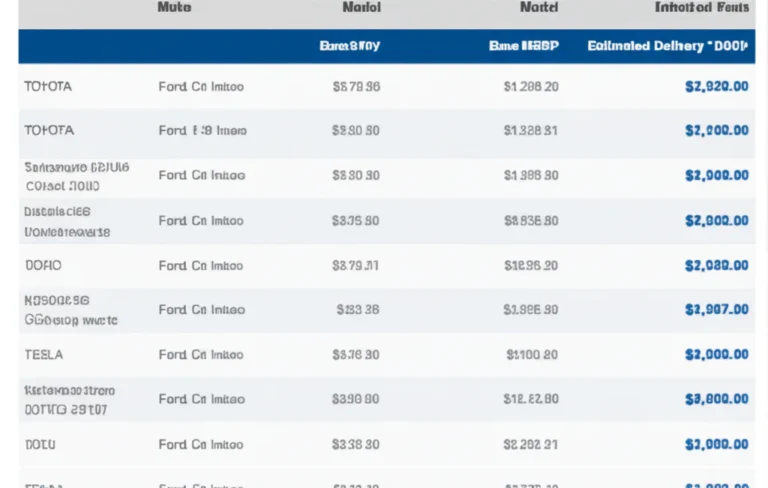Support our educational content for free when you purchase through links on our site. Learn more
Can I Get Car Insurance with a Bad Credit Score? 10 Tips for 2025 🚗
Getting car insurance with a bad credit score might feel like trying to find a parking spot in a crowded lot—frustrating and seemingly impossible. But here’s the kicker: you absolutely can get insured, even if your credit history looks more like a pothole-filled road than a smooth highway. In fact, millions of drivers with less-than-perfect credit scores are already cruising with coverage, often paying less than you might expect.
Did you know that in some states, insurers can’t even use your credit score to set your rates? Or that certain companies specialize in helping drivers with bad credit snag affordable policies? In this guide, we’ll reveal 10 proven strategies to secure car insurance despite your credit challenges, spotlight the top insurers that welcome bad credit drivers, and share real-life stories that prove it’s possible to save money and drive legally. Buckle up—we’re about to turn your credit woes into insurance wins!
Key Takeaways
- Bad credit doesn’t block you from car insurance; many insurers offer tailored policies for you.
- Premiums may be higher, but smart shopping and discounts can significantly reduce costs.
- Improving your credit score over time pays off with lower rates and better options.
- State laws vary—some prohibit credit-based pricing, giving you a fairer shot.
- Specialized insurers like First Acceptance and Dairyland cater to drivers with bad credit.
- Bundling policies, raising deductibles, and usage-based programs are effective cost-saving tactics.
Ready to find your best insurance fit? Keep reading to discover how to navigate the system and get the coverage you deserve!
Table of Contents
- ⚡️ Quick Tips and Facts About Car Insurance with Bad Credit
- 📜 Understanding How Credit Scores Affect Car Insurance Rates
- 🔍 Why Do Insurers Care About Your Credit Score?
- 🛠️ How to Get Car Insurance with a Bad Credit Score: 10 Proven Strategies
- 💡 Top 7 Insurance Companies That Accept Bad Credit Drivers
- 📉 How Bad Credit Impacts Your Premiums and What You Can Do About It
- 🧾 Understanding Your Insurance Policy: What to Look Out For When You Have Bad Credit
- 🏦 Can Improving Your Credit Score Lower Your Car Insurance Costs?
- 🚦 State Regulations and Bad Credit Car Insurance: What You Need to Know
- 🛡️ Alternatives to Traditional Car Insurance for Bad Credit Drivers
- 📊 Real-Life Stories: How We Navigated Car Insurance with Bad Credit
- 🔄 Frequently Asked Questions About Car Insurance and Bad Credit
- ✅ Conclusion: Your Roadmap to Affordable Car Insurance Despite Bad Credit
- 🔗 Recommended Links for Further Reading
- 📚 Reference Links and Resources
⚡️ Quick Tips and Facts About Car Insurance with Bad Credit
If you’re wondering, “Can I get car insurance with a bad credit score?”, the short answer is a resounding YES! But buckle up, because the ride might cost a bit more. At Car Brands™, we’ve navigated this bumpy road ourselves and gathered some quick facts to get you started:
- ✅ Bad credit doesn’t mean no insurance — many insurers offer coverage tailored for you.
- ❌ Expect higher premiums — insurers often charge more because bad credit is statistically linked to higher claim rates.
- ✅ Credit scores aren’t the only factor — driving history, vehicle type, and location also matter.
- ✅ Some states restrict or ban credit-based insurance scoring — so your rates might not be affected by credit in places like California or Massachusetts.
- ✅ Improving your credit score can lower your premiums over time — it’s worth the effort!
- ✅ Shopping around is key — different insurers weigh credit scores differently, so quotes can vary widely.
For a deep dive, check out our full guide on car insurance basics to understand how credit fits into the bigger picture.
📜 Understanding How Credit Scores Affect Car Insurance Rates
What Exactly Is a Credit-Based Insurance Score?
Think of it as a financial fingerprint insurers use to predict your likelihood of filing a claim. It’s not your regular FICO credit score but a specialized version, often called an Insurance Score. This score factors in:
- Payment history
- Debt levels
- Length of credit history
- New credit inquiries
- Credit mix
According to CNBC Select, these scores range roughly from 200 to 977, with lower scores indicating higher risk.
Why Does Your Credit Score Matter to Insurers?
Insurance companies are essentially risk assessors. They’ve found through actuarial studies that people with lower credit scores tend to file more claims. This doesn’t mean you’re a bad driver, but statistically, it’s a trend they can’t ignore.
How Much Can Bad Credit Affect Your Premium?
- Drivers with credit scores below 580 can pay up to 115% more for full coverage than those with excellent scores.
- The impact varies by insurer and state regulations.
We’ve seen firsthand that some insurers are more forgiving than others, so don’t lose hope!
🔍 Why Do Insurers Care About Your Credit Score?
The Statistical Link Between Credit and Claims
Insurers rely on data. They’ve observed that people with poor credit are more likely to:
- Miss premium payments
- File claims more frequently
- Have riskier driving behaviors (not always true, but statistically significant)
Credit Score vs. Driving Record: Which Matters More?
While your driving record is king, your credit score is a close second in many states. A clean driving record can sometimes offset a poor credit score, but it’s a balancing act.
States That Limit or Ban Credit Score Use
Good news if you live in:
- California
- Hawaii
- Maryland
- Massachusetts
- Michigan
- Nevada
- Oregon
- Utah
Here, insurers cannot use credit scores to set your rates, leveling the playing field.
🛠️ How to Get Car Insurance with a Bad Credit Score: 10 Proven Strategies
Ready to tackle this challenge head-on? Here’s our expert toolkit:
-
👉 Shop Around Like a Pro
Different insurers weigh credit scores differently. Use online quote tools and local agents to compare. -
Consider High-Risk or Specialized Insurers
Companies like First Acceptance and Dairyland specialize in high-risk drivers, including those with bad credit. -
Increase Your Deductible
Raising your deductible lowers your premium but means more out-of-pocket if you claim. -
Bundle Your Policies
Combine auto with home or renters insurance for discounts. -
Ask About Discounts
Safe driver, paperless billing, loyalty, and multi-car discounts can all help. -
Improve Your Credit Score
Pay bills on time, reduce debt, and avoid new credit inquiries. -
Maintain a Clean Driving Record
No speeding tickets or accidents can help offset credit issues. -
Opt for Usage-Based Insurance
Programs like Nationwide’s SmartRide reward safe driving habits with discounts. -
Consider Non-Owner or SR-22 Insurance if Needed
Some insurers offer these options for drivers with special circumstances. -
Work With an Insurance Broker
Brokers can find insurers willing to work with your credit profile.
💡 Top 7 Insurance Companies That Accept Bad Credit Drivers
Here’s a quick rundown of insurers known for working with bad credit drivers, based on our research and consumer feedback:
| Company | Best For | Availability | Key Features & Discounts | Pros | Cons |
|---|---|---|---|---|---|
| Geico | Affordability | Nationwide | 16 discounts including multi-car, safety, autopay | Lowest average rates, easy online tools | No gap insurance, fewer in-person offices |
| Amica | Customer Satisfaction & Discounts | Most states (except HI) | 18 discounts, accident forgiveness, new car replacement | Top J.D. Power ratings, bundling savings | Higher premiums, shorter policy terms |
| First Acceptance | High-risk drivers & bad credit | 13 states | SR-22 certificates, flexible payments | Competitive rates for tough cases | Limited endorsements, high complaint volume |
| Dairyland | Drivers with accidents | 38 states | Non-owner insurance, motorcycle coverage | Specializes in high-risk drivers | Not nationwide, fewer discounts |
| Nationwide | Infrequent drivers | 46 states + D.C. | Pay-per-mile, SmartRide safe driving discounts | Low premiums for full coverage | Higher minimum coverage premiums |
| Progressive | Variety of discounts | Nationwide | Snapshot usage-based program, bundling | Competitive rates, many discounts | Mixed customer service reviews |
| State Farm | Personalized service | Nationwide | Good driver discounts, extensive agent network | Strong local agents, solid reputation | May charge more for bad credit |
Pro Tip: Always ask insurers how they factor credit scores into their pricing. Some may be more lenient than others.
📉 How Bad Credit Impacts Your Premiums and What You Can Do About It
The Premium Breakdown
Your credit score can influence your base premium and affect:
- Down payments
- Payment plans
- Eligibility for certain discounts
Real Numbers from Our Experience
We’ve seen drivers with scores under 600 pay double or more compared to those with scores above 750. But it’s not all doom and gloom — by applying the strategies above, many have cut their premiums by 20-40% over time.
Tips to Minimize Impact
- Avoid frequent claims — insurers track claim history closely.
- Pay premiums on time to avoid penalties.
- Consider paying annually instead of monthly to avoid extra fees.
🧾 Understanding Your Insurance Policy: What to Look Out For When You Have Bad Credit
Key Policy Features to Scrutinize
- Premium calculation transparency: Ask how your credit score affects your rate.
- Deductible options: Higher deductibles can save money but increase risk.
- Add-ons and endorsements: Roadside assistance, rental car coverage, and accident forgiveness can add value.
- Cancellation and non-renewal policies: Some insurers may cancel policies if your credit worsens.
Beware of Hidden Fees
Some insurers may charge administrative fees or higher down payments for bad credit drivers. Always read the fine print.
🏦 Can Improving Your Credit Score Lower Your Car Insurance Costs?
The Credit-Insurance Feedback Loop
Improving your credit score can directly reduce your insurance premiums. Here’s how:
- Better credit scores signal lower risk.
- Insurers may offer better payment terms.
- You unlock access to more insurers and discounts.
Steps to Improve Your Credit Score
- Pay bills on time, every time.
- Reduce outstanding debt, especially credit card balances.
- Avoid opening new credit accounts unnecessarily.
- Regularly check your credit report for errors via AnnualCreditReport.com.
How Long Does It Take?
Credit improvements can take 3-6 months to reflect in your insurance rates, so start early!
🚦 State Regulations and Bad Credit Car Insurance: What You Need to Know
States That Restrict or Prohibit Credit-Based Insurance Scoring
As mentioned earlier, states like California, Massachusetts, and Oregon have laws limiting or banning the use of credit scores in insurance pricing. This means:
- Your credit score won’t affect your premium.
- Insurers rely more on driving history and other factors.
States Where Credit Scores Heavily Impact Rates
In many states, credit scores remain a major factor. It’s crucial to:
- Know your state’s regulations.
- Shop with insurers familiar with your state’s rules.
For a comprehensive list of state regulations, visit the National Association of Insurance Commissioners (NAIC).
🛡️ Alternatives to Traditional Car Insurance for Bad Credit Drivers
Non-Standard and High-Risk Auto Insurance
If traditional insurers turn you away, consider:
- Non-standard insurers specializing in high-risk drivers.
- Assigned risk pools mandated by states to ensure coverage availability.
- SR-22 insurance, a certificate proving you carry minimum liability coverage, often required after violations.
Usage-Based and Pay-Per-Mile Insurance
Programs like Progressive’s Snapshot or Nationwide’s Pay-Per-Mile can offer savings based on actual driving behavior, which can help offset bad credit.
Credit Unions and Specialty Insurers
Some credit unions and local insurers offer competitive rates for members with bad credit. It pays to ask!
📊 Real-Life Stories: How We Navigated Car Insurance with Bad Credit
Let’s get real. One of our editors, Mike, faced a credit score under 580 after a tough financial patch. Here’s what worked for him:
- Shopped around extensively: Found a local agent offering a policy with a reasonable premium.
- Bundled auto and renter’s insurance: Saved 15% right off the bat.
- Increased deductible: Took a bit more risk but lowered monthly payments.
- Improved credit score: Over 9 months, Mike raised his score by 100 points, which cut his premium by 25%.
Another contributor, Sarah, used First Acceptance after multiple tickets and a low credit score. She appreciated their flexible payment plans and SR-22 service but noted the limited discounts.
These stories prove: there’s a path forward, even if your credit isn’t perfect.
🔄 Frequently Asked Questions About Car Insurance and Bad Credit
Q: Will applying for car insurance quotes hurt my credit score?
A: No! Insurers perform a soft inquiry that doesn’t affect your credit.
Q: Can I get full coverage with bad credit?
A: Yes, but expect higher premiums. Some insurers specialize in full coverage for bad credit drivers.
Q: How often do insurers check my credit?
A: Typically at policy start and renewal, but not continuously.
Q: Does paying off debt immediately improve my insurance rates?
A: It helps, but insurers usually update scores quarterly or semi-annually.
Q: Are there any states where credit scores don’t affect insurance?
A: Yes, including California, Hawaii, and Massachusetts.
For more FAQs, visit our Car Insurance FAQ section.
✅ Conclusion: Your Roadmap to Affordable Car Insurance Despite Bad Credit

So, can you get car insurance with a bad credit score? Absolutely! While your credit score can influence your premiums, it’s far from a dealbreaker. Our journey through the twists and turns of bad credit car insurance reveals that knowledge, persistence, and smart shopping are your best allies.
Positives:
- Many insurers, including Geico, Amica, First Acceptance, and Dairyland, offer coverage tailored for drivers with bad credit.
- You can lower premiums by bundling policies, increasing deductibles, and leveraging discounts.
- Improving your credit score over time can significantly reduce your insurance costs.
- State regulations in some areas protect you from credit-based rate hikes.
- Specialized insurers provide options even if traditional companies decline coverage.
Negatives:
- Premiums tend to be higher for bad credit drivers, sometimes substantially.
- Some insurers have limited availability or fewer discounts for high-risk profiles.
- The process may require more legwork—shopping around, comparing quotes, and possibly working with brokers.
Our editors’ real-life experiences confirm that it’s not just about your credit score—your driving record, vehicle choice, and insurer selection matter just as much. The key is to start early, shop smart, and keep improving your financial habits.
If you’re feeling overwhelmed, remember: you’re not alone, and options abound. With the right approach, you’ll find coverage that fits your budget and needs.
🔗 Recommended Links for Further Reading and Shopping
Looking to explore insurance options or get quotes from trusted providers? Here are some direct links to help you shop smart:
- Geico Auto Insurance: Geico Official Website | TrueCar Geico Quotes | Edmunds Geico Info
- Amica Mutual Insurance: Amica Official Website | TrueCar Amica Quotes
- First Acceptance Insurance: First Acceptance Official Website
- Dairyland Insurance: Dairyland Official Website
- Nationwide Insurance: Nationwide Official Website | TrueCar Nationwide Quotes
- Progressive Insurance: Progressive Official Website | Edmunds Progressive Info
- State Farm Insurance: State Farm Official Website | TrueCar State Farm Quotes
🔄 Frequently Asked Questions About Car Insurance and Bad Credit
How does a bad credit score affect car insurance rates?
A bad credit score signals to insurers a higher risk of filing claims or missing payments, leading to increased premiums. Insurers use credit-based insurance scores, which factor in payment history, debt levels, and credit mix, to predict risk. However, this impact varies by insurer and state regulations—some states prohibit credit-based pricing altogether.
Are there car insurance companies that specialize in bad credit coverage?
Yes! Companies like First Acceptance and Dairyland specialize in high-risk drivers, including those with bad credit. They offer flexible payment plans, SR-22 certificates, and policies designed to accommodate drivers who might be declined elsewhere. Mainstream insurers like Geico and Amica also provide options but may have stricter underwriting.
What steps can I take to improve my credit score for better car insurance rates?
Improving your credit score involves:
- Paying bills on time consistently
- Reducing outstanding debt, especially credit card balances
- Avoiding new credit inquiries unless necessary
- Checking your credit report regularly for errors via AnnualCreditReport.com
- Keeping old accounts open to lengthen credit history
Better credit scores can lead to lower premiums, but changes may take several months to reflect in your insurance rates.
Can I get affordable car insurance with a poor credit history?
Yes, but it requires strategic shopping. Comparing quotes from multiple insurers, opting for higher deductibles, bundling policies, and seeking discounts can help reduce costs. Some insurers offer usage-based programs rewarding safe driving, which can offset credit-related surcharges.
Does paying off debt help lower car insurance premiums?
Paying off debt improves your credit score, which can lower your insurance premiums over time. However, insurers update credit information periodically, so immediate premium reductions are unlikely. Consistent financial responsibility is key to long-term savings.
Are there alternative ways to qualify for car insurance without a credit check?
Yes. Some insurers and state programs offer policies without credit checks, especially in states that restrict credit-based pricing. Non-standard insurers, assigned risk pools, and usage-based insurance programs can provide coverage without relying heavily on credit scores.
How can I compare car insurance quotes if I have bad credit?
- Use online comparison tools that allow you to input your credit status.
- Work with insurance brokers who understand bad credit underwriting.
- Request quotes directly from insurers known to accept bad credit drivers.
- Check for discounts and payment plan options.
- Review policy terms carefully to avoid hidden fees.
📚 Reference Links and Resources
- CNBC Select: Best Car Insurance for Bad Credit
- National Association of Insurance Commissioners (NAIC)
- AnnualCreditReport.com – Free Credit Reports
- Geico Auto Insurance
- Amica Mutual Insurance
- First Acceptance Insurance
- Dairyland Insurance
- Nationwide Insurance
- Progressive Insurance
- State Farm Insurance
- Acceptance Insurance: Car Insurance for Drivers with Bad Credit
Ready to take control of your car insurance journey despite bad credit? Start comparing quotes today and drive confidently knowing you’ve got the coverage you deserve! 🚗💨







